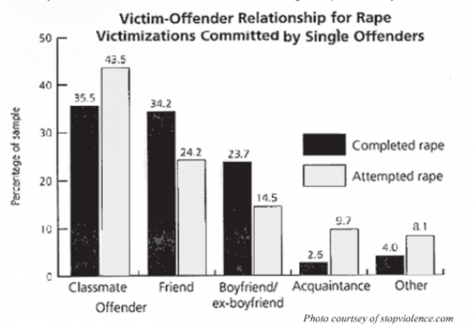Pace Sexual Assault Policy Being Reworked
The Sexual Assault Protocol Committee at Pace is working to create a more informed campus. They want students to know how to prevent sexual assault and other safety issues, and they want victims of sexual assault to know how to report the assault.
The Huffington Post reported on a case of sexual assault that occurred last February at the Pace University New York City campus. The female student and victim of the sexual assault felt that her privacy was violated when she told a Pace University healthcare employee about the incident and the employee reported the case to other Pace authorities. This triggered an investigation that the female student did not want.
This is just one example of a sexual assault case on a college campus. The change in policy of Pace University is not reported as a direct response to the NYC campus case. It is an effort to create a safer campus, adhere to new Title IX legislation, and resolve an issue that has been plaguing college campuses for years.
A part of Title IX – a federal law that universities must adhere to- requires schools to have a sexual assault policy and to respond to reasonable knowledge of a sexual assault. New additions to this legislation will require terms such as “sexual assault” and “consent.”
“There are so many articles from across the country about sexual assault in colleges,” Martirano said. “The issue’s been around for a long time, and students need to know we’re (Pace University) working to fix it.”
Martirano is a part of the Sexual Assault Response Protocol committee at Pace. This committee, which is comprised of both faculty and students, is currently working on revising the sexual assault policy of Pace University. The new policy will include clearer definitions, information about safety training, and a list of confidential disclosure options. The result of this new policy will, the committee hopes, lead to a more informed campus.
The committee is working on more effective communication of resources available to students who have been involved in sexual assault or other issues; students will be informed about resources available to them within Pace and outside of Pace. Students will also be informed which resources offer confidentiality and which cannot.
Confidentially can be an issue for students, as is evident in the Pace NYC case; some may want to report assault confidentially, and a clearer policy will allow them to avoid confusion with how to do so.
Along with defining the terms “sexual assault” and others as required by new legislation, Pace’s policy will also include “interpretive guidance” to allow for a clear policy and understanding of the terms, according to Lisa Miles, Affirmative Action Officer and Title IX Coordinator at Pace University.
The committee’s work on the new policy will help provide students with methods to intervene if they witness sexual assault or other safety problems on campus. Bystander training and increased safety education will be implemented along with the new policy. Miles hopes that the new policy will be completed and implemented at the beginning of next semester- spring 2015.
The first “Step Up” Bystander Training Program on Sexual Assault and Alcohol/Drug Abuse, took place on September 14 in the Goldstein Fitness Center. Some students and faculty were invited to participate in the program; resident directors and resident assistants have already been trained on sexual assault response. There will be future training programs specialized for people to train as first responders and other training programs designed for all Pace students.
“More training and a clearer policy will be good, as long as people follow through with any training and information given to them,” sophomore LeeAnn Reynolds said.
The Sexual Assault Protocol Committee has asked students, teachers, and student affairs professionals to create a more effective communication strategy- a strategy to inform students about the resources available to them.
“We believe that as a result….there will be clearer communications about the confidential resources that are available to the community,” Miles said, “so that students are empowered to make a more informed decision about how they choose to seek help if they should ever become the victim of sexual violence.”
“External experts” have been enlisted to assist with training initiatives. Faculty experts, the Women’s Justice Center, students, and staff are all involved with policy and training initiatives as well.
“We are committed to a safe campus community,” Miles said
Your donation supports independent, student-run journalism at Pace University. Support the Pace Chronicle to help cover publishing costs.



